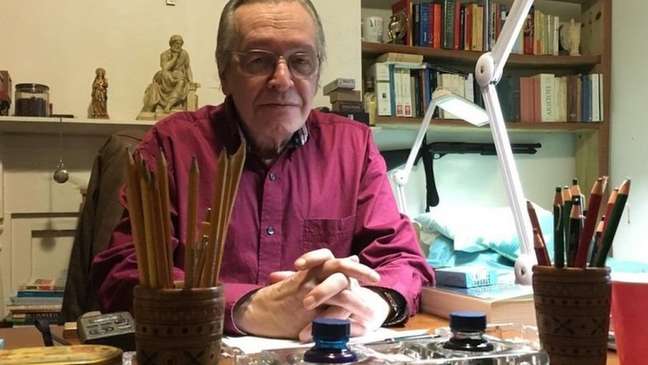The writer and philosopher’s speeches on institutional collapse and radicalization circulated in messaging apps and social networks in the days leading up to the invasion of Brasilia.

“Tell me this: How many boardrooms have you taken over? None. How many newspaper offices have you taken over? None. How many unions have you taken over? None. How many liberation theology churches have you taken over? None. In short, you left everything in their hands. Communists, and everything is in their hands. And they do what they want. Do you understand?”
Speeches by writer Olavo de Carvalho (1947-2022) encouraging radical actions circulated frequently on messaging apps and social networks in the days leading up to the invasion of Brasilia by Bolsonarist groups.
The snippet above is taken from a TikTok post from two weeks ago. The video appeared at the top of the list (indicated in the “Best” tab) when searching for the name of the writer and philosopher. Wanted by BBC News Brasil, the company did not comment.
Another excerpt with the voice of Olavo, who died at the age of 74 in January last year, gained even more prominence in the context of scenes of vandalism and looting of the headquarters of the Three Powers: the Palazzo Planalto, the National Congress and the Federal Supreme Court. .
Says the writer in the audio: “I find military intervention extremely difficult, except after a process of taking power by the people themselves. If you have a generalized civil disobedience movement … the people surround the palace, do not come the senator in, don’t let the minister in, don’t let the judge in… if it gets to this point, the Armed Forces will enter”.
radicalization
In order to have the influence it still has today, to the point of being an ideological reference in aggressive actions of institutional rupture, Olavo de Carvalho’s ideas and the same trajectory have undergone a radicalization and have largely benefited from the diffusion power of social networks.
The writer emerged in the public arena in the 1990s as a conservative columnist for major Brazilian newspapers and, in the 2000s, established himself as a promoter of Internet debate spaces linked to a rising Brazilian new right.
“It gave density to a young generation that witnessed the growth of the Workers’ Party and resisted what was then considered the hegemony of the left in Brazilian thought, thought in the arts and culture in general,” says João Cezar de Castro Rocha, professor of Comparative Literature at the State University of Rio de Janeiro (Uerj).

Guru
But, among the elements that initially brought more charm, popularity and loyalty to Olavo de Carvalho, there is the figure of the “guru” who indicated ways to resolve the eminently existential anxieties of his followers.
“It seems strange to say it, but [o olavismo] it is not a movement born with the intention of outlining political objectives and methods. He was born with an existential, spiritual profile, which aims, in some way, to help, restore order in the inner soul of the one who will become his disciple or of those who will become his devotees”, says a writer identified with the right Brazilian who prefers not to identify herself. .
Researcher Michele Prado, in her book Ideological storm (Lux, 2021), points out that “Olavo de Carvalho put into practice a proposal for the ‘cultural and spiritual renaissance’ of Brazil through the creation of an ‘intellectual elite group’ under his leadership”.
“Olavo introduced in his students an enormous sense of pride, superiority and invincibility which, making them fanatical in favor of their figure, will result in people without moral limits, as we testify”, writes Prado.
Diogo Chiuso, who was curator of the writer’s works at a publishing house in Campinas (SP), says that the radicalization of OLAV ideas began in 2013, with the June protests across the country.
“He went deeper into politics from there. He started talking about overthrowing the system. I joked that he sounded like the [Guilherme] petanque [hoje deputado federal do PSOL e, à época, figura central do Movimento dos Trabalhadores Sem-Teto]. It was at this point that things changed, I think he saw an opportunity to overthrow the powers, to turn his discourse more towards politics,” says Chiuso, who is the author of the book What’s left of politics (Noétika, 2022).
“But the conclusion I come to is that he did not see this overthrow of the political system through democracy as possible.”
Social networks as a way to the Holavist discourse
Olavo de Carvalho’s style fits well with the nature of the Internet and social media, analyzes Castro Rocha, of Uerj.
“The public figure he has assumed seems made for the digital universe, which among other things is characterized by the so-called attention economy. You need to have an attitude that attracts the attention of others. Olavo himself was already a meme. The expressions he made, the body language… for each sentence, many curses and for each curse the repetition of an obsession.”
However, Castro Rocha notes, Olavo’s memetic appeal has been accompanied by an escalation of aggression and intolerance towards the opposite camp: radicalization in discourse.
“He took on an angry, intolerant character, who used the most vulgar words, who cursed his opponents and who, above all, revealed the development of a radical intolerance towards everything that was not a mirror. It was the rhetoric of hatred from the hand and the logic of the other, the refutation of the other, which are powerful tools of language for making the other, the different, into nothingness to be symbolically eliminated.
According to Castro Rocha, the influence of Olavo de Carvalho will persist much longer than the influence of Bolsonarismo. by him as a way to explain what we are experiencing. I repeat: Olavo’s presence will far exceed the presence of Bolsonarismo in Brazil,” he says. “This is particularly serious, because his thoughts are marked by contempt for the university and the inability to deal with each other.” .
– This text was published in https://www.bbc.com/portuguese/brasil-64256711
+The best content in your email for free. Choose your favorite Terra newsletter. Click here!
Source: Terra
Camila Luna is a writer at Gossipify, where she covers the latest movies and television series. With a passion for all things entertainment, Camila brings her unique perspective to her writing and offers readers an inside look at the industry. Camila is a graduate from the University of California, Los Angeles (UCLA) with a degree in English and is also a avid movie watcher.






